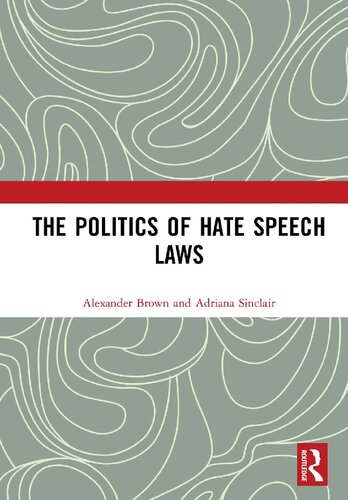

Most ebook files are in PDF format, so you can easily read them using various software such as Foxit Reader or directly on the Google Chrome browser.
Some ebook files are released by publishers in other formats such as .awz, .mobi, .epub, .fb2, etc. You may need to install specific software to read these formats on mobile/PC, such as Calibre.
Please read the tutorial at this link: https://ebookbell.com/faq
We offer FREE conversion to the popular formats you request; however, this may take some time. Therefore, right after payment, please email us, and we will try to provide the service as quickly as possible.
For some exceptional file formats or broken links (if any), please refrain from opening any disputes. Instead, email us first, and we will try to assist within a maximum of 6 hours.
EbookBell Team

4.8
24 reviewsThis book examines the complex relationship between politics and hate speech laws, domestic and international. How do political contexts shape understandings of what hate speech is and how to deal with it? Why do particular states enact hate speech laws and then apply, extend or reform them in the ways they do? What part does hate speech play in international affairs? Why do some but not all states negotiate, agree and ratify international hate speech frameworks or instruments? What are some of the best and worst political arguments for and against hate speech laws? Do political figures have special moral duties to refrain from hate speech? Should the use of hate speech by political figures be protected by parliamentary privilege? Should this sort of hyperpolitical hate speech be subject to the laws of the land, civil and criminal? Or should it instead be handled by parliamentary codes of conduct and procedures or even by political parties themselves? What should the codes of conduct look like?
Brown and Sinclair answer these important and overlooked questions on the politics of hate speech laws, providing a substantial body of new evidence, insights, arguments, theories and practical recommendations. The primary focus is on the UK and the US but several other country contexts are also explored and compared in detail, including: Nigeria, Kenya, South Africa, India, China, Japan, Turkey, Germany, Hungary, and Italy. Methodologically, the two authors draw on approaches and concepts from a range of academic disciplines, including: law and legal theory, political theory, applied ethics, political science and sociology, international relations theory and international law.